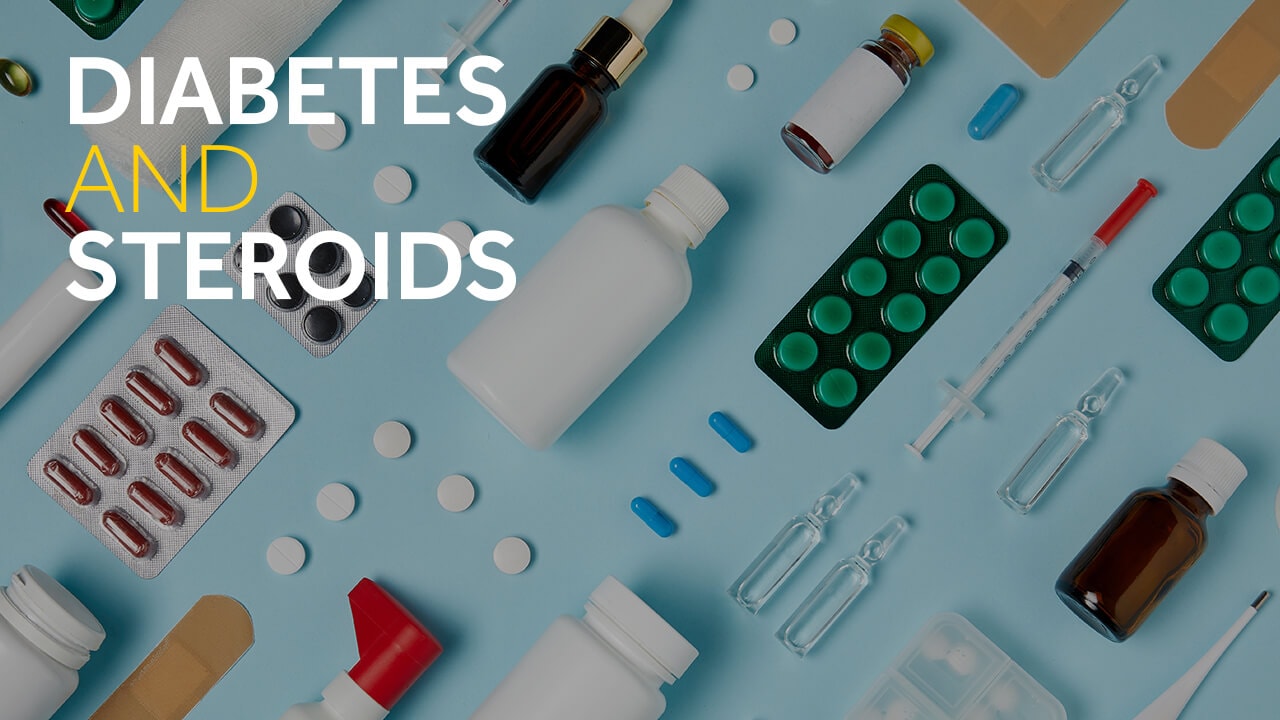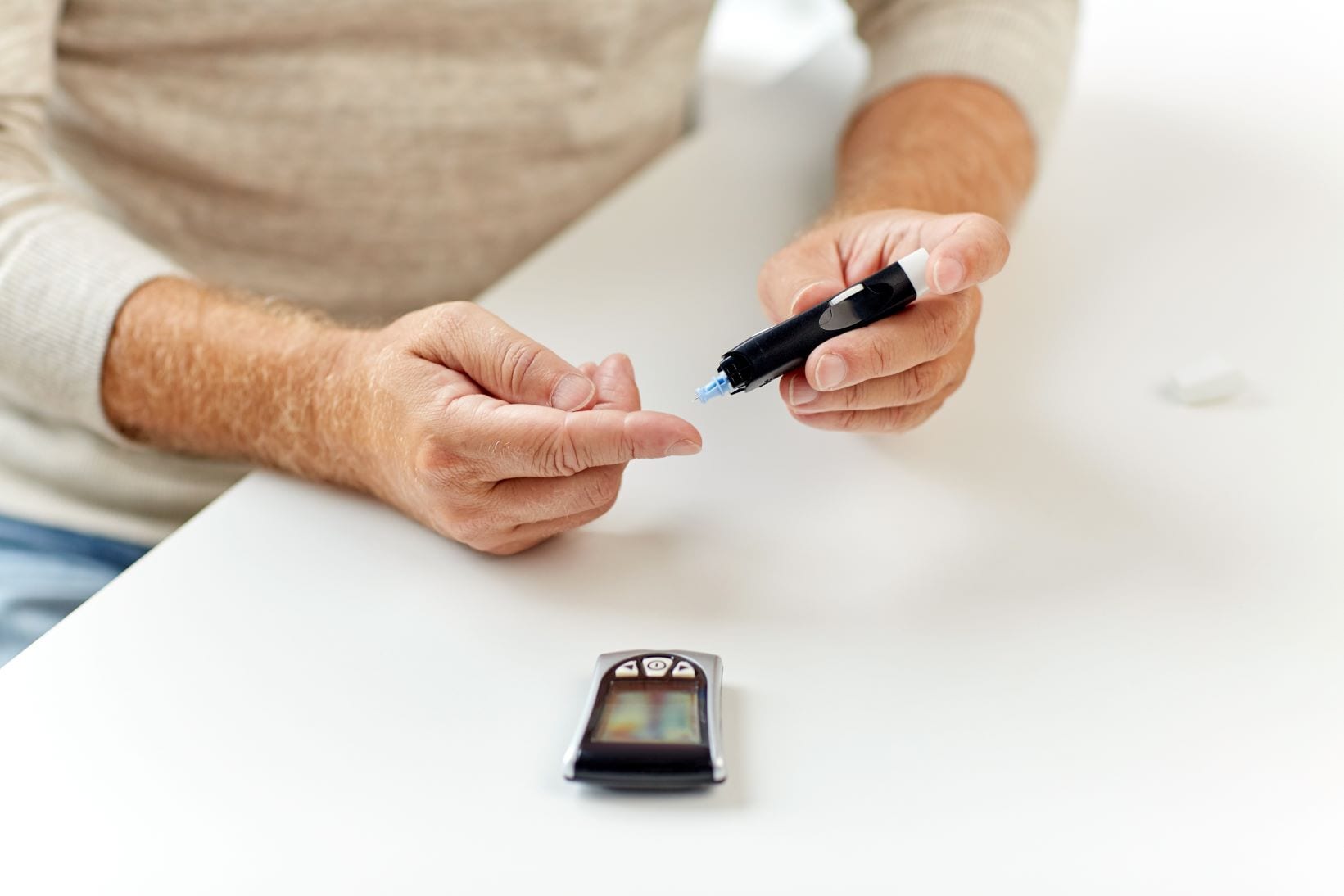Steroids and diabetes: The effect on high blood sugar

There are various reasons that people take steroid medications. Reasons include bone or muscle injury, pain, lung conditions such as asthma flare-ups, and influenza infections. COVID-19 can cause shortness of breath and breathing problems1 and steroids might be used. If your medical provider prescribes a steroid medication, here are some things you should know.
What are steroids?
The label “steroid” is a general term; glucocorticoid is the more specific medical term. Glucocorticoids are naturally made in the body (by the kidney’s adrenal glands) and they have anti-inflammatory properties. They also regulate metabolism (which includes glucose metabolism).
In addition to steroids that the body naturally produces, there are also synthetic versions that are designed to act like hormones that reduce inflammation. Some common generic names of glucocorticoids that can affect the entire body system (called systemic) are prednisone, hydrocortisone and dexamethasone.
There are inhaled glucocorticoids that affect the lungs directly and include beclomethasone, budesonide, fluticasone.2 Inhaled glucocorticoids are used for asthma and long-term lung conditions such as Chronic Obstructive Pulmonary Disease (COPD). There are also topical glucocorticoids in the form of lotions or creams which include hydrocortisone and betamethasone.
In this article, we will focus on systemic (i.e. oral, injected, or inhaled) glucocorticoids that we’ll call “steroids” since these are the most likely to affect glucose levels.
What if I’m prescribed steroids and have diabetes?
A known side effect of systemic steroids is elevated glucose levels (hyperglycemia). As you know, this can be especially challenging for people with diabetes. Insulin is the best way to counteract hyperglycemia caused by steroids. In a hospital setting, individuals can receive steroids by IV (intravenous) route. IV doses are often much higher than you would get from oral pills.
In the hospital, the medical providers might prescribe different types of insulin to be given at different times of the day to help reduce hyperglycemia.3 If you’re taking steroid pills at home, you might not be starting any new insulin, but you can ask your provider for guidance on the dose to take of your current insulin. Some steroids, such as prednisone, can raise the glucose level for part of the day. This will be most noticeable if the prednisone is only taken once per day, such as in the morning.
Before you take the morning prednisone pill, your glucose level might be the same as it usually is. But later in the day, your glucose level could be a lot higher. This is because steroids increase insulin resistance causing your body’s own insulin or injected insulin to not work as well.4 Some people are especially worried about what they eat because they think the food is causing the unusually high glucose reading, but it is most likely from the steroid.
What should I keep in mind while taking steroids?
If you’re using an insulin pump, the basal rate can be increased slightly for part of the day, if needed. You can do this using a temporary basal rate. If you are using the MiniMed 670G system, ask your provider if you should switch to Manual Mode during the time you are taking the steroid.
One of the best ways to determine if you need a higher basal rate is by monitoring your glucose level using a continuous glucose monitor (CGM) such as the GuardianTM Connect system or MiniMedTM insulin pump systems. Consider how many days you will be taking the steroid. If you only take the steroid for a few days, the long-term impact of hyperglycemia is unknown. But you do want to avoid short-term consequences of high glucose such as dehydration or diabetic ketoacidosis (DKA)5:
- Be sure to stay well hydrated with sugar-free beverages.
- Check your glucose several times per day and as directed by your healthcare team.
- According to the American Diabetes Association, experts advise checking for ketones every 4-6 hours when your glucose level is above 240 mg/dL. Let your healthcare provider know if you have ketones in your urine, especially if the level is moderate or higher.
- Talk with your provider about your insulin dose and always follow their advice. If you do increase your insulin dose while you are taking steroids, be sure to go back to your usual dose when you stop taking the steroids.
- Do not stop your steroid medication early, unless recommended by your healthcare provider.
We hope these tips are helpful for you! One of the most popular blogs of all time here at The LOOP is on steroid usage and diabetes, so we wanted to bring it back to you along with some new tips.
[Originally published 2015-08-27. Updated 2020-10-29]
References:
1Centers for Disease Control and Prevention. Coronavirus Disease 2019 (COVID-19) Your Health: Symptoms of Coronavirus. https://www.cdc.gov/coronavirus/2019-ncov/symptoms-testing/symptoms.html Accessed October 21, 2020.
2Egbuonu F, Antonio FA, Edavalath M. Effect of Inhaled Corticosteroids on Glycemic Status. The Open Respiratory Medicine Journal, 2014, 8, (Suppl 1: M7) 101-105.
3Grommesh B, Lausch MJ, Vannelli AJ et al. Hospital Insulin Protocol Aims for Glucose Control in Glucocorticoid-Induced Hyperglycemia. Endocr Pract 2016; 22:180-189.
4Bevier WC, Zisser PHC, Jovanovič L et al. Use of Continuous Glucose Monitoring to Estimate Insulin Requirements in Patients with Type 1 Diabetes Mellitus During a Short Course of Prednisone. J Diabetes Sci Technol 2008;2(4):578-583.
5American Diabetes Association. Diabetes Complications: DKA (Ketoacidosis) & Ketones. https://www.diabetes.org/diabetes/complications/dka-ketoacidosis-ketones Accessed October 21, 2020.
IMPORTANT SAFETY INFORMATION
– Medtronic Diabetes insulin infusion pumps, continuous glucose monitoring systems and associated components are limited to sale by or on the order of a physician and should only be used under the direction of a healthcare professional familiar with the risks associated with the use of these systems.
– Successful operation of the insulin infusion pumps and/or continuous glucose monitoring systems requires adequate vision and hearing to recognize alerts and alarms.
Medtronic Diabetes Insulin Infusion Pumps
– Insulin pump therapy is not recommended for individuals who are unable or unwilling to perform a minimum of four blood glucose tests per day. – Insulin pumps use rapid-acting insulin. If your insulin delivery is interrupted for any reason, you must be prepared to replace the missed insulin immediately.
Medtronic Diabetes Continuous Glucose Monitoring (CGM) Systems
– The information provided by CGM systems is intended to supplement, not replace, blood glucose information obtained using a home glucose meter. A confirmatory fingerstick is required prior to treatment. – Insertion of a glucose sensor may cause bleeding or irritation at the insertion site. Consult a physician immediately if you experience significant pain or if you suspect that the site is infected.
Important Safety Information
MINIMED 670G™ SYSTEM
The Medtronic MiniMed™ 670G system is intended for continuous delivery of basal insulin (at user selectable rates) and administration of insulin boluses (in user selectable amounts) for the management of type 1 diabetes mellitus in persons, seven years of age and older, requiring insulin as well as for the continuous monitoring and trending of glucose levels in the fluid under the skin. The MiniMed™ 670G system includes SmartGuard™ technology, which can be programmed to automatically adjust delivery of basal insulin based on Continuous Glucose Monitor sensor glucose values and can suspend delivery of insulin when the sensor glucose value falls below or is predicted to fall below predefined threshold values. The system requires a prescription. The Guardian™ Sensor (3) glucose values are not intended to be used directly for making therapy adjustments, but rather to provide an indication of when a fingerstick may be required. A confirmatory finger stick test via the CONTOUR®NEXT LINK 2.4 blood glucose meter is required prior to making adjustments to diabetes therapy. All therapy adjustments should be based on measurements obtained using the CONTOUR®NEXT LINK 2.4 blood glucose meter and not on values provided by the Guardian™ Sensor (3). Always check the pump display to ensure the glucose result shown agrees with the glucose results shown on the CONTOUR®NEXT LINK 2.4 blood glucose meter. Do not calibrate your CGM device or calculate a bolus using a blood glucose meter result taken from an Alternative Site (palm) or from a control solution test. It is not recommended to calibrate your CGM device when sensor or blood glucose values are changing rapidly, e.g., following a meal or physical exercise. If a control solution test is out of range, please note that the result may be transmitted to your pump when in the “Always” send mode.
WARNING: Medtronic performed an evaluation of the MiniMed™ 670G system and determined that it may not be safe for use in children under the age of 7 because of the way that the system is designed and the daily insulin requirements. Therefore this device should not be used in anyone under the age of 7 years old. This device should also not be used in patients who require less than a total daily insulin dose of 8 units per day because the device requires a minimum of 8 units per day to operate safely. |



